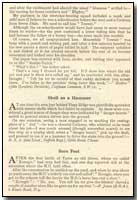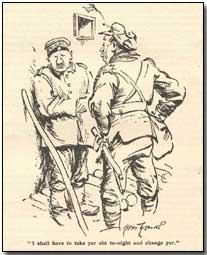Memoirs & Diaries - The Best 500 Cockney War Stories - Shell as a Hammer and Other Stories
 Published in London
in 1921, The Best 500 Cockney War Stories
comprised, in the words of its newspaper publisher (The London Evening
News) "a remembering and retelling of those war days when laughter
sometimes saved men's reason".
Published in London
in 1921, The Best 500 Cockney War Stories
comprised, in the words of its newspaper publisher (The London Evening
News) "a remembering and retelling of those war days when laughter
sometimes saved men's reason".
The collection of short memoirs, some 500 in total, is divided into five categories - Action, Lull, Hospital, High Seas and Here and There. This page contains five stories from Lull, led by Shell as a Hammer.
Other sections within the collection can be accessed using the sidebar to the right.
Shell as a Hammer
At one time the area just behind Vimy Ridge was plentifully sprinkled with enemy shells which had failed to explode. As these were considered a great source of danger they were indicated by "danger boards" nailed to pointed stakes driven into the ground.
On one occasion, seeing a man engaged in so marking the resting-place of a "dud" - he was a cheerful Cockney, who whistled as he went about his job - I was much amused (though somewhat scared) to see him stop at a nearby shell, select a "danger board," pick up the shell, and proceed to use it as a hammer to drive the stake into the ground!
H. S. A. (late Lieut., Suffolk Regt.), Glebe Road, Cheam
Sore Feet
After the first battle of Ypres an old driver, whom we called "Krongie," had very bad feet, and one day reported sick at the estaminet where the M.O. held office.
After the examination he ambled up the road, and when he was about 50 yards away the M.O.'s orderly ran out and called: "Krongie, when you get to the column tell the farrier the M.O.'s horse has cast a shoe."
"Krongie" : "Ho, yus. You tell 'im ter give the blinkin' cheval a couple of number nines like he gave me for my feet."
P. Jones (R.H.A.), 6 Ennis Road, N.4
My Sword Dance - by the C.O.
A bitterly cold morning in winter, 1916, in the Ypres Salient. I was on duty at a gas alarm post in the front line when along came the colonel.
He was the finest soldier and gentleman I ever had the pleasure to serve under (being an old soldier in two regiments before, I had experienced a few C.O.s).
It was said he knew every man's name in the regiment. No officer dare start his own meal until every man of his company had been served. No fatigue or working party ever went up the line, no matter at what hour, without the colonel first inspected it.
He had a mania for collecting spare ammunition, and more than once was seen taking up to the front line a roll of barbed wire over his shoulder hooked through his stick. To him every man was a son, and to the men's regret and officers' delight he soon became a general.
This particular morning he approached me with "Good morning, Walker. You look cold. Had your rum?" To which I replied that I had, but it was a cold job remaining stationary for hours watching the wind.
"Well," said the C.O., "do this with me." With that he started marking time at a quick pace on the duck-boards and I did likewise. We kept it up for about two minutes, while others near had a good laugh.
"Now you feel better, I know. Do this every ten minutes or so," he said, and away he went to continue his tour of inspection.
My Cockney pal in the next bay, who, I noticed, had enjoyed the scene immensely, said, "Blimey, Jock, was he giving you a few lessons in the sword dance or the Highland Fling?"
"Jock" Walker (late Royal Fusiliers), 29 Brockbank Road, Lewisham, S.E.13
A Big Bone in the Soup
IN Baghdad, 1917, "Buzzer" Lee and I were told off to do "flying sentry" round the officers' lines from 3 to 5 a.m.
Well, we commenced our duty, and Buzzer suggested we visit the mess kitchen to see all was well, and in case there was anything worth "knocking off" (as he called it) in the way of char or scran (tea or bread and butter).
The mess kitchen was in darkness, and Buzzer began scrounging around. After a while he said: "I've clicked, mate! Soup in a dixie!"
By the light of a match he found a cup, removed the dixie lid, and took a cup of the "soup."
"We're in the market this time, mate," said Buzzer, and took out a cupful for me.
"It don't taste like Wood's down the New Cut," I said, doubtfully. He dipped the cup again and exclaimed: "'Ere, I've fahnd a big bone!"
It was a new broom-head, however; it had been left in the dixie to soak for the night!
G. H. Griggs (late Somerset L.I.), 3 Ribstone Street, Hackney, E.9
"I Shall have to Change Yer!"
In the Ypres Salient in July 1915 Headquarters were anxious to know which German regiment was facing us. An immense Cockney corporal, who was particularly good on patrol, was instructed to secure a prisoner.
After a night spent in No Man's Land he returned at dawn with a capture, an insignificant little German, trembling with fear, who stood about five foot nothing.
Lifting him on to the fire-step and eyeing him critically, the corporal thus addressed him: "You won't do for our ole man; I shall have to take yer aht tonight and change yer!"
S. Back, Merriams Farm, Leeds, near Maidstone
Next - Scots Reveille and four other stories
A 'Tour' was a period of front-line service.
- Did you know?

